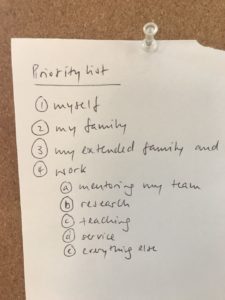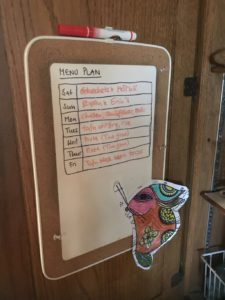
With school now back in full swing, I was reminded of how chaotic our days can get – backpacks on the stairs, toys on the floor, half-eaten breakfasts, and me running after the kids with barely finished makeup trying to hurry them out the door. It’s time to review my strategies on how to structure life as a full-time working mom without losing sight of our family’s priorities. With 70% of us working, and over 75% of us employed full time and 40% of us the primary or sole earners, managing a healthy work-life balance is an important topic. We’re relatively new to Birmingham, and our families live far away (mine is in Switzerland, my husband’s in the Philadelphia area and in Maine). We don’t have a fall-back option like grandma or aunts and uncles in case things get iffy. I’m sure I’m not the only one in this situation, so I thought I would share some of the strategies I’ve learned over the years.
I call it the POPP principle – Prioritize, Outsource, Prepare/Plan, and Partner.
1. Prioritize
The first step of the POPP principle is to prioritize. I think this is so self-evident that many of us forget to do it, or forget ourselves in the process. For me, this involved much thinking, honestly. I have a thriving career and a job that I deeply care for. I’m one of the lucky ones who made her passion her job. My work is part of my identity, and it’s been easy to become wrapped up in my job. Obviously, when we started to have a growing family, there needed to be rethinking. It’s a process, and depending on the circumstances, priorities have to be adjusted.
Here is my current personal priority list, which hangs in my office to remind me of what’s important to me when things get hectic:

People chuckle when I say I make myself number one. I must say though, I learned this one the hard way. I realized that I’m the glue that holds this family together. If the glue is dried up, it won’t work. I try to give myself daily and weekly breaks to recharge and recover.
My family is next. It’s extremely important to me to spend quality time with my immediate family, but also with friends. I could go to a work-related event almost every night, but because my family is my priority, I say no to a lot of work engagements, especially if they are at night. I want to read to my kids, snuggle with them at bed time, and have the opportunity for deep conversations with my husband. I believe that making conscious decisions about your priorities and how you want to spend your time is the key to a successful and happy life.
2. Outsource
The second step of the POPP principle is to outsource. To make sure I get that quality time with my family, I outsource what I don’t like to do very much. For us, that’s bi-weekly cleaning help. We also order a lot of stuff online because neither of us likes shopping. For you, this could be online grocery shopping and delivery, hiring a lawn service for your yard or a contractor to work on house projects, or ordering take out a couple of nights a week. There are also some programs that ship fresh ingredients and recipes to your door that don’t take much time to cook (I recommend Blue Apron or Hello Fresh, but there are many others. Here are some reviews of meal delivery services.)
3. Plan

I wouldn’t be able to get anything done without a detailed plan. I know this sounds boring, but having a thorough plan has changed my life and given me calmness and peace of mind. What works for me is that I put everything in my work calendar, even the small things (like “hat day” at school, because I know how important it is for my son to wear a hat on hat day). I’ve tried other options such as multiple calendars, both online and in paper, lists, etc., but for myself, I found that having one calendar works best. It does lead to funny conversations with my assistant every once in a while (“What’s hat day? Do I need to bring one?”), but hey, that’s a small trade-off for peace of mind. Other strategies we use include a weekly menu plan (We map everything out on the weekend and shop once a week.), a clear routine for mornings and evenings, and yes, a chore day on the weekend so we can have a “Sunday-Fun Day” with the family.
4. Partner
The final P of the POPP principle is the most important. The main reason why I can be a good mom and advance my career at the same time is because my husband and I are true partners. We have divided the work and responsibilities at home to make sure we get quality time with each other and the family. For example, I have the mornings with the kids, and my husband picks them up, giving me the flexibility to finish something at work. It is my responsibility to cook during the week and tend to the yard, he is in charge of paying bills and taking care of the car, and so on. You get the idea. This way, our daily life runs very smoothly, and we don’t spend a lot of time negotiating who does what.
I realize that my examples are highly personal and relate well to my personality (I am a planner and organizer) and might not work for you, your work, or your budget. At the same time, I think that the underlying ideas of the POPP principle – prioritize, outsource, plan, and partner – really work for everyone if adapted to your specific situation.











